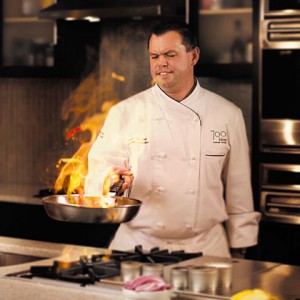So you’ve chosen the kitchen as your office where you can put all of your five senses to use. A career in culinary is an enticing path to take.
There’s a plethora of opportunities open for you in the culinary field where you’ll constantly be challenged and your education is non-stop!

Skills to Posses
Depending on what type of career you choose, employers will ask for specific skills. However, according to Cooking Schools, there are three main skills that any culinary artist should have:
Technical
Technical skills are your basic skills—knife skills, cooking methods, timing, and the most important: making every dish with grace (even under pressure).
Culinary
Most chefs have a good base when they first start out, but there’s more to cooking than boiling water—new flavor combinations, creative presentations, learning new cultural cuisines and much more! Traveling abroad and trying new dishes is a great way to develop this skill. Book a hotel in Hong Kong and take the time to taste the unique dishes offered in food markets and local restaurants for ideas of new recipes.
Organizational and Managerial
These two skills determine the difference between a cook and a chef. A chef not only cooks, but he/she is able to manage and run a kitchen. Organization skills are important, especially when running a kitchen smoothly and effectively. A chef also knows how to run a business.
Careers
Caterer
Catering is a bit like restaurant cooking except you’re cooking for a large group of people in which the food will be displayed as a buffet line or a longer service. Caterers are often hired for large events such as banquet parties, weddings, birthdays, family gatherings, graduations, or any other type of large-scale function.
Personal Chef
This is a field that is becoming more and more popular. You’re either working for a single client or for several clients. You never know, maybe you will be working for a celebrity or in the Playboy Mansion.
Nutritionist
This career combines culinary skills with science. You’ll be focusing on how specific foods react to the human body as well as preparing or advising specific meals to clients. You know to know biology, chemistry and a lot of other “hard”-sciences in order to succeed in this field. Many times you will be advising clients on how to lose weight or how to lead healthier lives based on their biological composition/genetic makeup.
Food Scientist
These types of scientists focus on the chemical and technical aspect of food. They’re the ones who let people know whether certain types of foods need to be recalled or not and are often found working for organizations such as the Food and Drug Administration (FDA). You may also find yourself in a laboratory performing research for a company who makes, sells or distributes food.
Other Careers
– Culinary Instrutor
– T.V. Cook
– Baker
– Restaurant Owner
– Cruise Ship Staff
– Hospital Cooking Staff
– Schools/Universities
– Corporate Facilities
With your passion for food, there’s a wide field of career opportunities for you. People will always need others to cook, prepare or dissect the food for them—that’s where you come in.
If you want to get a cutting board for a culinary student Personalized By Kate has great custom ones.


